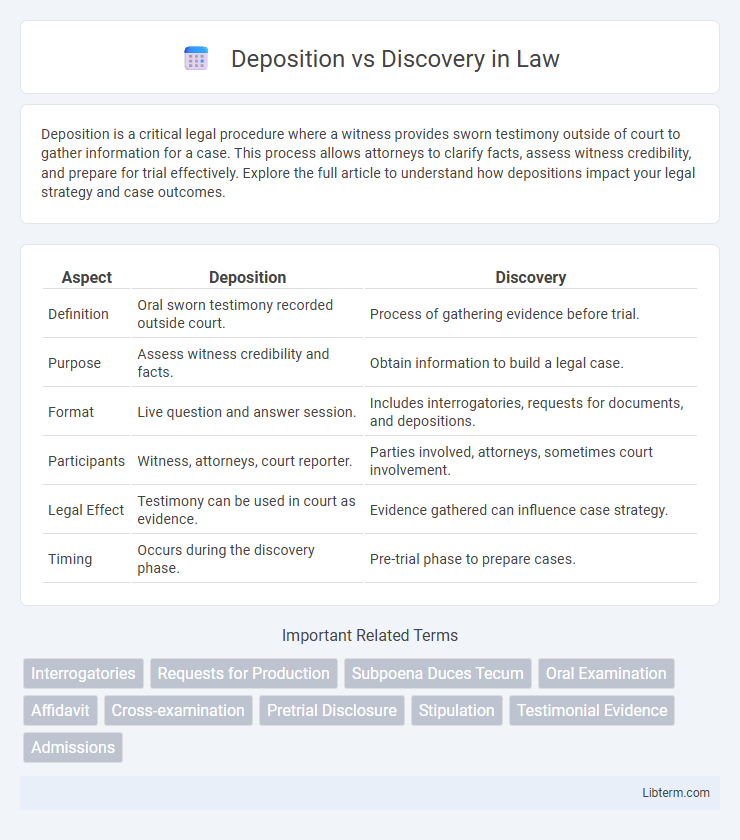Deposition is a critical legal procedure where a witness provides sworn testimony outside of court to gather information for a case. This process allows attorneys to clarify facts, assess witness credibility, and prepare for trial effectively. Explore the full article to understand how depositions impact your legal strategy and case outcomes.
Table of Comparison
| Aspect | Deposition | Discovery |
|---|---|---|
| Definition | Oral sworn testimony recorded outside court. | Process of gathering evidence before trial. |
| Purpose | Assess witness credibility and facts. | Obtain information to build a legal case. |
| Format | Live question and answer session. | Includes interrogatories, requests for documents, and depositions. |
| Participants | Witness, attorneys, court reporter. | Parties involved, attorneys, sometimes court involvement. |
| Legal Effect | Testimony can be used in court as evidence. | Evidence gathered can influence case strategy. |
| Timing | Occurs during the discovery phase. | Pre-trial phase to prepare cases. |
Understanding Deposition and Discovery
Deposition and discovery are critical components of the pre-trial phase in civil litigation that facilitate evidence gathering and case preparation. A deposition involves sworn, out-of-court oral testimony recorded for later use in court, allowing attorneys to examine witnesses and parties under oath. Discovery encompasses a broader process including depositions, interrogatories, requests for documents, and admissions, aimed at uncovering relevant facts and avoiding surprises during trial.
Key Definitions: Deposition vs Discovery
A deposition is a pre-trial procedure where a witness provides sworn testimony outside the courtroom, often recorded for later use. Discovery is the broader legal process of exchanging information and evidence between parties before trial, encompassing depositions, interrogatories, and document requests. Understanding the distinction between deposition as a specific evidence-gathering tool and discovery as the overarching information exchange is crucial in litigation strategy.
The Purpose of Discovery in Legal Proceedings
The purpose of discovery in legal proceedings is to gather relevant evidence and clarify facts before trial, ensuring both parties have access to information that supports their claims or defenses. This process includes depositions, interrogatories, and document requests, aimed at promoting fairness and preventing surprises during litigation. Effective discovery helps streamline the trial process by identifying key issues and facilitating settlements.
What Happens During a Deposition?
During a deposition, attorneys from both sides question a witness or party under oath to gather detailed testimony and evidence. The deponent answers verbal questions while a court reporter transcribes the entire session, creating an official record. This process allows lawyers to evaluate the credibility of testimony and uncover information critical for trial preparation or settlement negotiations.
Major Differences Between Deposition and Discovery
Depositions are sworn, out-of-court testimonies where witnesses provide verbal evidence, while discovery encompasses the entire pre-trial process of exchanging information between parties. Discovery includes methods such as interrogatories, requests for production, and depositions, aimed at gathering facts and documents relevant to the case. Key differences lie in format and purpose: depositions capture detailed witness testimonies under oath, whereas discovery broadly involves collecting and reviewing diverse evidence to build legal strategies.
The Role of Attorneys in Discovery and Deposition
Attorneys play a critical role in both discovery and deposition by strategizing the scope of information sought and preparing clients for questioning. During discovery, lawyers draft and respond to interrogatories, requests for documents, and admissions to gather relevant evidence efficiently. In depositions, attorneys meticulously question witnesses to obtain testimony, identify inconsistencies, and preserve statements essential for trial preparation and case evaluation.
Common Types of Discovery Methods
Common types of discovery methods in litigation include depositions, interrogatories, requests for production, and requests for admission. Depositions involve sworn, out-of-court oral testimony recorded for later use, allowing parties to examine witnesses in detail. Interrogatories are written questions requiring written responses under oath, while requests for production seek documents or electronically stored information relevant to the case.
Legal Rights and Obligations in Each Phase
During deposition, parties have the legal right to question witnesses under oath, with an obligation to provide truthful and complete testimony, forming a record for trial use. In discovery, parties are obligated to disclose relevant documents and information while possessing the right to request such evidence to build their case. Both phases require compliance with court rules and protection of privileged information to avoid sanctions or exclusion of evidence.
Impact of Depositions on Case Outcomes
Depositions play a critical role in shaping case outcomes by providing direct testimony under oath, allowing attorneys to assess witness credibility and gather detailed evidence before trial. The information obtained during depositions can lead to early case resolutions, settlements, or strategic adjustments that influence the final verdict. Effective use of depositions often strengthens a party's position by uncovering key facts and inconsistencies that impact trial preparation and negotiation leverage.
Best Practices for Navigating Deposition and Discovery
Effective deposition and discovery practices center on thorough preparation and clear communication to ensure accurate fact-finding and reduce disputes. Carefully reviewing relevant documents and formulating precise questions help maximize information gathering while maintaining procedural compliance. Maintaining detailed records and adhering to deadlines strengthens case strategy and supports a robust legal process.
Deposition Infographic

 libterm.com
libterm.com